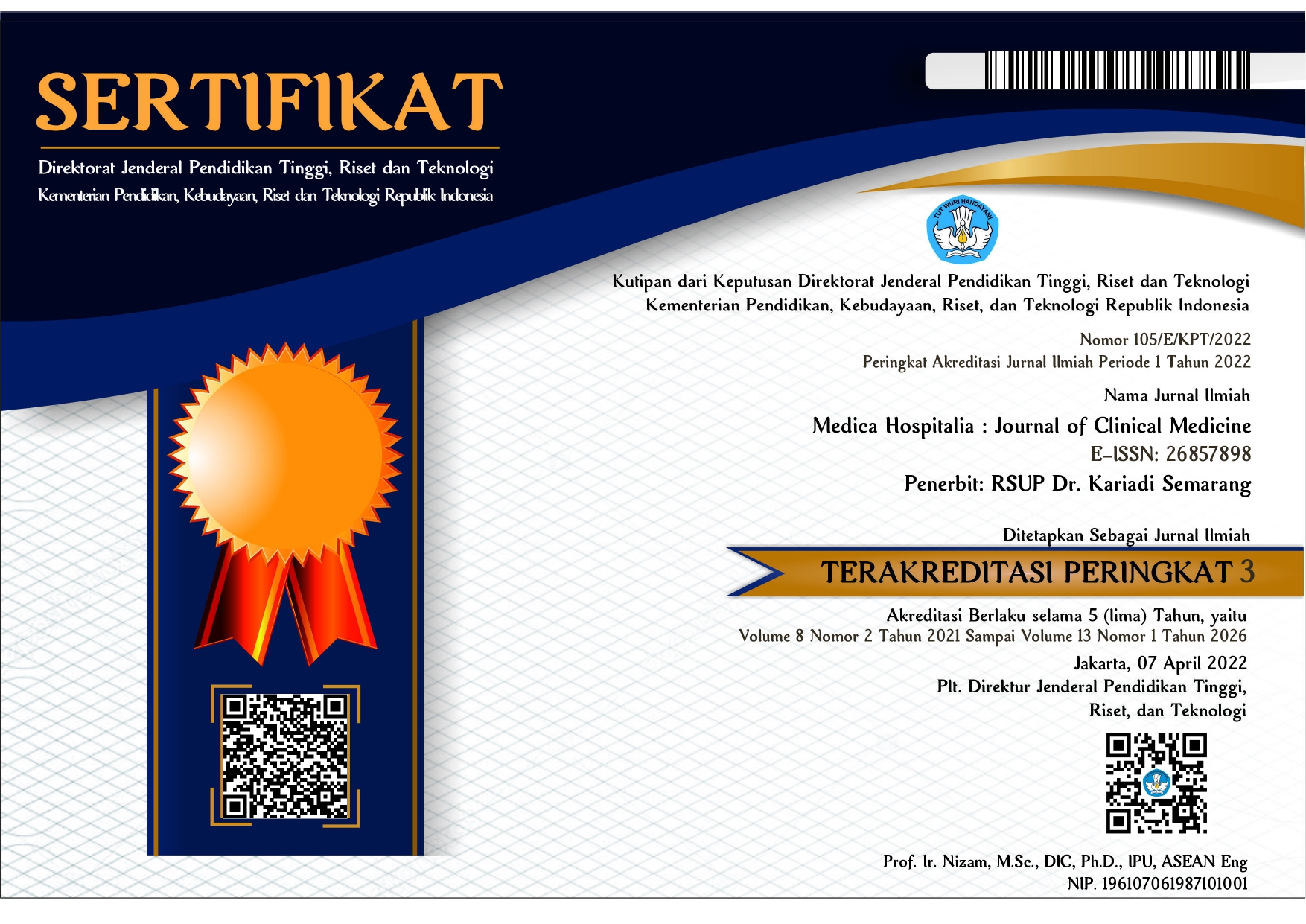Pengaruh Perawatan Paliatif Terhadap Peningkatan Kualitas Hidup Penderita Karsinoma Nasofaring Stadium Lanjut di RSUP Dr. Kariadi Semarang
DOI:
https://doi.org/10.36408/mhjcm.v6i2.393Abstract
Background: Palliative care can improve the quality of life for patients with end stage nasopharyngeal carcinoma (NPC). Palliative care includes handling nutrition, relieving pain and reducing the severity of symptoms from the disease, side effects of therapy or other complaints. It also improve psychological, social and spiritual aspects. The purpose of this study was to analyze the effect of palliative care on improving the quality of life for end stage NPC patients.
Methods: Observational cohort study in 15-70 years old NPC patients included in the screening criteria for palliative care (total score 4). The sample was divided into 2 groups, 20 sampels per group. Quality of life was assessed with modified Gill scale questionnaire. Data was analyzed with t test.
Results: The quality of life of NPC patients increased after palliative care (score 31,8 to 35,6). Decreased in groups without palliative care (score 33,0 to 30,9). Statistical analysis found significant differences between before and after palliative care (p = 0.055).
Conclusion: Palliative care improves the quality of life for end stage NPC patients.
Key word: Quality of life, Palliative care, Nasopharyngeal carcinoma
Latar belakang : Perawatan paliatif dapat meningkatkan kualitas hidup penderita karsinoma nasofaring (KNF) stadium lanjut. Perawatan paliatif meliputi penanganan nutrisi, menghilangkan nyeri dan mengurangi keparahan gejala yang timbul akibat penyakit tersebut ataupun akibat efek samping terapi atau keluhan lain yang tidak lagi responsif terhadap terapi kuratif, serta mengupayakan perbaikan dalam aspek psikologis, sosial dan spiritual. Tujuan penelitian ini adalah menganalisis pengaruh perawatan paliatif terhadap peningkatan kualitas hidup penderita KNF stadium lanjut.
Metode : Penelitian kohort observasional pada penderita KNF stadium lanjut usia 15 – 70 tahun yang masuk dalam kriteria penapisan perawatan paliatif (total skor 4). Sampel dibagi menjadi 2 kelompok yaitu kelompok perlakuan dan kelompok kontrol. Besar sampel ditentukan sebanyak 20 tiap kelompok. Kualitas hidup dinilai dengan kuesioner modifikasi skala mc Gill. Analisis data dengan Uji t test.
Hasil : Kualitas hidup penderita KNF meningkat setelah dilakukan perawatan paliatif (skor 31,8 menjadi 35,6). Menurun pada kelompok tanpa perawatan paliatif (skor 33,0 menjadi 30,9). Analisis statistik didapatkan perbedaan bermakna antara sebelum dan sesudah dilakukan perawatan paliatif p=0,055.
Simpulan : Perawatan paliatif meningkatkan kualitas hidup penderita KNF stadium lanjut.
Key word : Kualitas hidup, Perawatan paliatif, Karsinoma Nasofaring
Downloads
Additional Files
Published
How to Cite
Issue
Section
Citation Check
License
Copyright (c) 2019 Medica Hospitalia : Journal of Clinical Medicine

This work is licensed under a Creative Commons Attribution-ShareAlike 4.0 International License.
Copyrights Notice
Copyrights:
Researchers publishing manuscrips at Medica Hospitalis: Journal of Clinical Medicine agree with regulations as follow:
Copyrights of each article belong to researchers, and it is likewise the patent rights
Researchers admit that Medica Hospitalia: Journal of Clinical Medicine has the right of first publication
Researchers may submit manuscripts separately, manage non exclusive distribution of published manuscripts into other versions (such as: being sent to researchers’ institutional repository, publication in the books, etc), admitting that manuscripts have been firstly published at Medica Hospitalia: Journal of Clinical Medicine
License:
Medica Hospitalia: Journal of Clinical Medicine is disseminated based on provisions of Creative Common Attribution-Share Alike 4.0 Internasional It allows individuals to duplicate and disseminate manuscripts in any formats, to alter, compose and make derivatives of manuscripts for any purpose. You are not allowed to use manuscripts for commercial purposes. You should properly acknowledge, reference links, and state that alterations have been made. You can do so in proper ways, but it does not hint that the licensors support you or your usage.

























